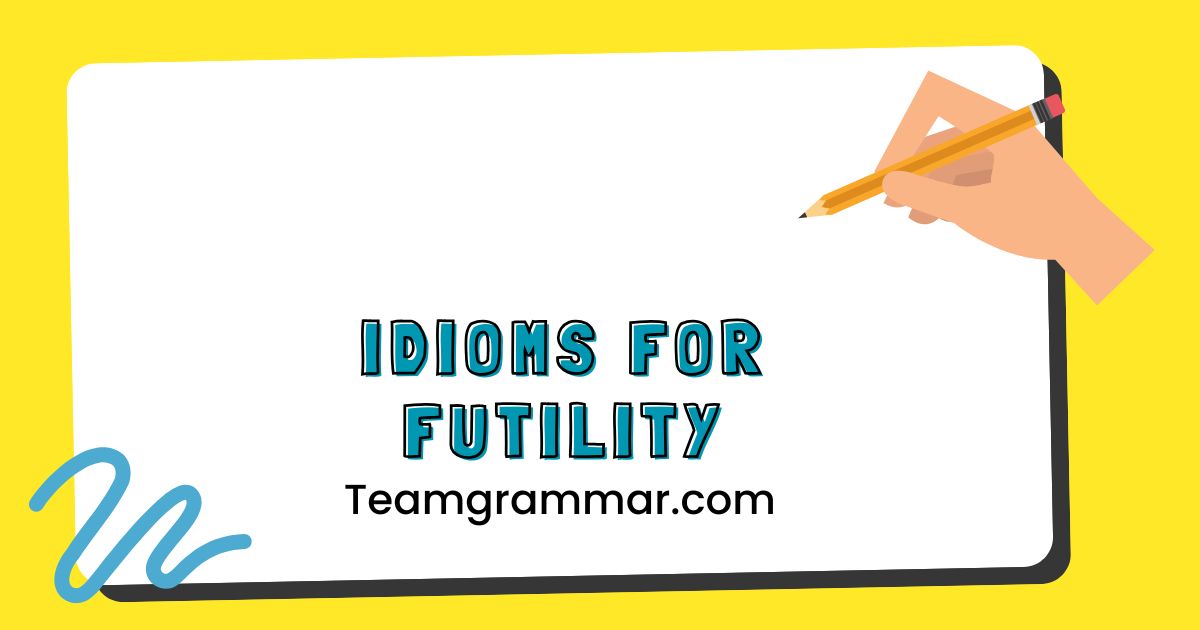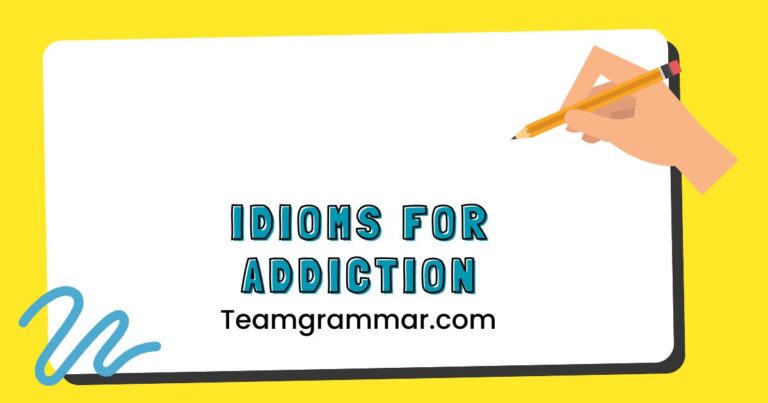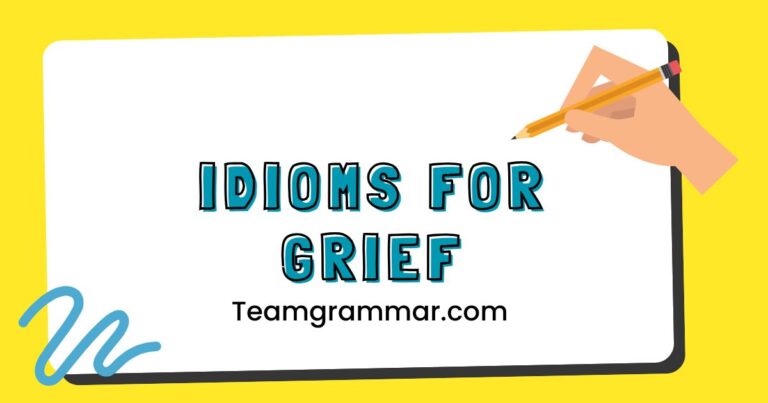37 Idioms for Futility: Mastering Expressions of Uselessness
Understanding idioms is crucial for mastering the English language, as they add color and depth to communication. This article focuses on idioms that express futility – the sense of pointlessness or ineffectiveness.
These idioms are particularly useful in conveying frustration, resignation, or a lack of positive outcome. This guide is beneficial for English language learners of all levels, from beginners seeking to expand their vocabulary to advanced speakers aiming to refine their expressive capabilities.
By learning these idioms, you can communicate more effectively and understand nuanced conversations with greater ease.
Table of Contents
- Introduction
- Definition of Idioms for Futility
- Structural Breakdown
- Types and Categories of Futility Idioms
- Examples of Futility Idioms
- Usage Rules for Futility Idioms
- Common Mistakes with Futility Idioms
- Practice Exercises
- Advanced Topics in Futility Idioms
- Frequently Asked Questions (FAQ)
- Conclusion
Definition of Idioms for Futility
Idioms for futilityare fixed expressions or phrases whose overall meaning cannot be deduced from the literal definitions of the individual words. In other words, they are sayings that express the sense of something being pointless, useless, or ineffective.
These idioms are essential for conveying nuances of frustration, resignation, or the lack of a desired outcome in a more colorful and impactful way than simple, literal language.
The primary function of these idioms is to add emotional depth and cultural context to communication. They allow speakers to express complex feelings about situations where effort is wasted, goals are unattainable, or circumstances are inherently hopeless.
Understanding these idioms is not just about knowing the words; it’s about grasping the underlying cultural understanding and emotional weight they carry.
Structural Breakdown
Idioms, by their nature, defy straightforward structural analysis. They often consist of common verbs, nouns, and prepositions combined in unique ways to create a meaning that is distinct from their literal components.
However, we can observe some common structural patterns in idioms of futility:
- Verb + Preposition Combinations: Many idioms use a verb followed by a preposition to create a sense of wasted effort or lack of progress (e.g., beat against in “beat your head against a brick wall”).
- Figurative Language: Metaphors and similes are frequently used to illustrate the futility of a situation (e.g., “like banging your head against a brick wall”).
- Noun Phrases: Some idioms are built around noun phrases that evoke a sense of uselessness or emptiness (e.g., “a fool’s errand”).
The key thing to remember is that the meaning of the idiom is not the sum of its parts. Instead, it’s a culturally understood phrase with a specific, non-literal meaning.
Types and Categories of Futility Idioms
Idioms for futility can be broadly categorized based on the aspect of futility they emphasize:
Effort-Related Futility
These idioms describe situations where effort is being expended, but without any positive result. They highlight the wasted energy and the frustration of putting in work that leads nowhere.
Outcome-Related Futility
This category focuses on situations where the desired outcome is unattainable, regardless of the effort put in. These idioms emphasize the hopelessness of the situation and the inevitability of failure.
Situation-Related Futility
These idioms describe situations that are inherently futile due to their nature or circumstances. They often point to systemic issues or unavoidable obstacles that make success impossible.
Examples of Futility Idioms
Here are some examples of idioms for futility, categorized by the type of futility they express. Each category includes a table with examples, their meanings, and example sentences.
Effort-Related Futility Examples
The following table provides idioms that describe situations where effort is being expended without any positive result.
| Idiom | Meaning | Example Sentence |
|---|---|---|
| Beating a dead horse | Wasting effort on something that is over or unchangeable. | Trying to convince him to change his mind is like beating a dead horse; he’s already made his decision. |
| Banging your head against a brick wall | Trying to achieve something impossible or extremely difficult. | Trying to get the software to work with the old system is like banging your head against a brick wall. |
| Tilting at windmills | Fighting imaginary enemies or pursuing an unrealistic goal. | Protesting against the new policy feels like tilting at windmills; the decision has already been made. |
| Flogging a dead horse | Similar to “beating a dead horse,” wasting effort on something that’s over. | There’s no point in flogging a dead horse; let’s move on to a new topic. |
| Water off a duck’s back | Efforts or criticisms having no effect on someone. | Her insults are like water off a duck’s back; they don’t bother him at all. |
| Going around in circles | Making no progress; being stuck in a repetitive, unproductive cycle. | We’ve been going around in circles in this meeting for hours without reaching a decision. |
| Running around like a headless chicken | Being busy and agitated but achieving nothing. | She’s been running around like a headless chicken trying to get everything done before the deadline. |
| Chasing rainbows | Pursuing an unattainable or unrealistic goal. | He’s always chasing rainbows, dreaming of winning the lottery. |
| Trying to nail jelly to a wall | Attempting the impossible. | Getting him to agree to anything is like trying to nail jelly to a wall. |
| Pushing water uphill | Attempting a task that is extremely difficult or impossible. | Trying to change the company culture is like pushing water uphill. |
| Sisyphusian task | A task that is endless and futile. | Cleaning up after the kids feels like a Sisyphusian task. |
| Spinning your wheels | Expending effort but making no progress. | I feel like I’m just spinning my wheels at this job; I’m not learning anything new. |
| Pouring water into a leaky bucket | Wasting resources on something that cannot be saved. | Giving him more money is like pouring water into a leaky bucket; he’ll just waste it. |
| Empty gestures | Actions that appear meaningful but have no real effect. | Her apologies were just empty gestures; she didn’t really mean them. |
| Shadow boxing | Fighting an imaginary opponent; dealing with unreal problems. | The politicians are just shadow boxing over issues that don’t matter to ordinary people. |
| Stirring up a hornet’s nest | Creating trouble or problems unnecessarily. | Bringing up that old argument is just stirring up a hornet’s nest. |
| Barking up the wrong tree | Pursuing a mistaken course of action or accusing the wrong person. | If you think he’s the one who stole the money, you’re barking up the wrong tree. |
| Like talking to a brick wall | Trying to communicate with someone who doesn’t listen or understand. | Trying to explain my feelings to him is like talking to a brick wall. |
| A fool’s errand | A task or activity with no hope of success. | Sending him to find that document is a fool’s errand; it doesn’t exist. |
| Going nowhere fast | Making no progress despite being active. | We’re going nowhere fast with this project if we don’t get more funding. |
| Lost cause | A person or thing that can no longer be helped or improved. | Trying to fix that old car is a lost cause; it’s too damaged. |
| A wild goose chase | A pointless and time-wasting search. | They sent us on a wild goose chase looking for a file that didn’t exist. |
| Water under the bridge | Something that happened in the past and is no longer important or relevant. | That argument is water under the bridge; let’s move on. |
Outcome-Related Futility Examples
This table features idioms that describe situations where the desired outcome is unattainable, regardless of the effort put in.
| Idiom | Meaning | Example Sentence |
|---|---|---|
| Crying over spilled milk | Being upset about something that has already happened and cannot be changed. | There’s no use crying over spilled milk; we need to focus on what we can do now. |
| Shutting the barn door after the horse has bolted | Taking action too late to prevent something bad from happening. | Increasing security now is like shutting the barn door after the horse has bolted; the damage is already done. |
| Locking the stable door after the horse has bolted | Same as above. Taking action too late to prevent something bad from happening. | Locking the stable door after the horse has bolted won’t help now. |
| Spilled milk | Something that has happened and cannot be undone, often used in the context of regret. | The mistake has been made, it’s just spilled milk. |
| It’s no use | There is no point in doing something because it will not be successful. | It’s no use trying to fix it now, it’s broken beyond repair. |
| Whistling in the dark | Trying to stay cheerful or confident in a dangerous or hopeless situation. | His optimism is just whistling in the dark; he knows we’re in trouble. |
| Fighting a losing battle | Engaging in a conflict that is certain to be lost. | Trying to save the company is like fighting a losing battle. |
| A voice crying in the wilderness | Someone advocating for something that no one else supports. | He felt like a voice crying in the wilderness when he spoke out against the decision. |
| Dead end street | A situation with no possibility of progress or advancement. | This job is a dead end street; there’s no room for growth. |
| In vain | Without success or result; futile. | All our efforts were in vain; we couldn’t save the business. |
| Water under the dam | Events or issues that are in the past and no longer of concern. | The argument we had is water under the dam; let’s move forward. |
| Wouldn’t hold water | Not valid or logical; unable to withstand scrutiny. | His explanation wouldn’t hold water; it was full of holes. |
| All for naught | All efforts were wasted; everything was for nothing. | After all that work, it was all for naught when the project was canceled. |
| A shot in the dark | An attempt that has little chance of success. | Applying for that job is a shot in the dark, but I’ll try anyway. |
| Like shouting into the wind | Trying to communicate with someone who is not listening or paying attention. | Arguing with him is like shouting into the wind; he never changes his mind. |
| Love’s Labour’s Lost | Effort wasted on something that yields no return. | Their attempt to revive the project was simply Love’s Labour’s Lost. |
| A fool’s paradise | A state of happiness based on false hope or ignorance. | He’s living in a fool’s paradise if he thinks he can get away with that. |
| Blood from a stone | Something that is impossible to obtain. | Trying to get him to admit he was wrong is like getting blood from a stone. |
| Trying to catch the wind | Attempting something that is inherently impossible. | Trying to control the situation is like trying to catch the wind. |
| As well try to catch the wind in a net | Attempting something completely impossible. | You might as well try to catch the wind in a net as to persuade him. |
| A castle in the air | An unrealistic plan or hope; a daydream. | His plans to become a millionaire are just castles in the air. |
| Much ado about nothing | A great deal of fuss about something unimportant. | The whole controversy was much ado about nothing. |
| All talk and no action | Someone who makes promises but does not deliver. | He’s all talk and no action when it comes to helping around the house. |
| Dead in the water | Failed and having no chance of success. | The project is dead in the water after the funding was cut. |
Situation-Related Futility Examples
The following table contains idioms describing situations that are inherently futile due to their nature or circumstances.
| Idiom | Meaning | Example Sentence |
|---|---|---|
| Like rearranging deck chairs on the Titanic | Making minor changes to a system that is doomed to fail. | Focusing on office décor is like rearranging deck chairs on the Titanic; the company is going bankrupt. |
| A lost ball in the high weeds | Something that is lost and unlikely to be found. | Trying to find the missing document is like looking for a lost ball in the high weeds. |
| A house of cards | A structure or plan that is weak and likely to collapse. | The company’s success is built on a house of cards; it could all fall apart at any moment. |
| A pie in the sky | An unrealistic or improbable idea. | His plan to build a colony on Mars is just a pie in the sky. |
| Trying to unscramble eggs | Attempting to reverse something that has already happened and cannot be undone. | Trying to fix the damage done to the company’s reputation is like trying to unscramble eggs. |
| An exercise in futility | An action that is pointless or ineffective. | Trying to convince him to change his mind is an exercise in futility. |
| A fool’s paradise | A state of happiness based on false hope or ignorance. | He’s living in a fool’s paradise if he thinks he can get away with that. |
| Holding back the tide | Attempting to prevent something that is inevitable. | Trying to stop technological progress is like holding back the tide. |
| Closing the gate after the cows get out | Taking action too late to prevent a problem. | Implementing new security measures now is like closing the gate after the cows get out. |
| Watering a desert | Wasting resources on something unproductive. | Investing in that failing company is like watering a desert. |
| Trying to teach an old dog new tricks | Attempting to change someone’s habits or behavior that are long-established. | Trying to get him to use the new software is like trying to teach an old dog new tricks. |
| Off on the wrong foot | To start something badly. | The meeting started off on the wrong foot due to technical difficulties. |
| Digging a hole to fill another | Solving one problem by creating another. | Borrowing money to pay off debt is like digging a hole to fill another. |
| A day late and a dollar short | Too late and insufficient. | His apology was a day late and a dollar short. |
| Like a fart in a windstorm | Something insignificant and easily overlooked. | His contribution was like a fart in a windstorm; no one noticed it. |
| Casting pearls before swine | Offering something valuable to someone who doesn’t appreciate it. | Explaining the intricacies of quantum physics to him is like casting pearls before swine. |
| A flash in the pan | Something that shows initial promise but fails to deliver. | His success was just a flash in the pan; he quickly faded into obscurity. |
| A tempest in a teapot | A great disturbance over a minor matter. | The whole argument was just a tempest in a teapot. |
| Gilding the lily | Trying to improve something that is already perfect. | Adding more features to the already excellent app is just gilding the lily. |
| Putting lipstick on a pig | Making superficial improvements to something that is fundamentally flawed. | Renovating the old building is just putting lipstick on a pig; it needs to be demolished. |
| Waiting for Godot | Waiting for something that is unlikely to happen. | They’re waiting for Godot if they think he’s going to show up. |
| A fool and his money are soon parted | A foolish person will quickly lose their money. | He bought that expensive gadget, proving that a fool and his money are soon parted. |
| Out of the frying pan and into the fire | Going from a bad situation to a worse one. | He left his old job and went out of the frying pan and into the fire when he joined that company. |
Usage Rules for Futility Idioms
Using idioms correctly requires an understanding of their specific meanings and contexts. Here are some guidelines:
- Context Matters: Idioms should be used in situations where their figurative meaning is appropriate. Avoid using them in formal or technical contexts where precise language is required.
- Audience Awareness: Be mindful of your audience’s familiarity with the idiom. Some idioms are more common than others, and using obscure ones can lead to confusion.
- Grammatical Consistency: Ensure that the idiom fits grammatically within the sentence. For example, if an idiom uses a plural noun, make sure it agrees with the verb.
- Avoid Overuse: Using too many idioms can make your language sound unnatural or forced. Use them sparingly to add emphasis and color.
- Understand the Nuance: Some idioms have similar meanings but different connotations. Choose the idiom that best captures the specific shade of futility you want to express.
Common Mistakes with Futility Idioms
Here are some common mistakes to avoid when using idioms for futility:
- Literal Interpretation: The most common mistake is interpreting the idiom literally. Remember that idioms have a figurative meaning that is different from the sum of their parts.
- Misusing the Idiom: Using an idiom in the wrong context or with the wrong meaning.
- Incorrect Grammar: Altering the structure or wording of the idiom, which can change its meaning or make it nonsensical.
- Overusing Idioms: Using too many idioms in a short space, making your language sound unnatural.
Correct vs. Incorrect Examples:
| Incorrect | Correct | Explanation |
|---|---|---|
| “He is beating a dead dog.” | “He is beating a dead horse.” | The correct idiom is “beating a dead horse,” not “dog.” |
| “She cried on spilled milk.” | “She cried over spilled milk.” | The correct idiom is “cried over spilled milk.” |
| “He’s running like a headless chicken.” | “He’s running around like a headless chicken.” | The correct idiom includes “around.” |
Practice Exercises
Test your understanding of idioms for futility with these exercises.
Exercise 1: Fill in the Blanks
Fill in the blanks with the appropriate idiom from the list below.
(beating a dead horse, tilting at windmills, crying over spilled milk, banging your head against a brick wall, a fool’s errand)
| Question | Answer |
|---|---|
| 1. Trying to convince him to invest in that project is like __________. | banging your head against a brick wall |
| 2. There’s no point in __________; we can’t change what happened. | crying over spilled milk |
| 3. Arguing with him about politics is like __________. | beating a dead horse |
| 4. Trying to fight the new regulations is like __________. | tilting at windmills |
| 5. Sending him to find that file is __________. | a fool’s errand |
| 6. Trying to get them to agree is like __________. | banging your head against a brick wall |
| 7. He is __________ trying to find his car keys after he lost them at the beach. | beating a dead horse |
| 8. We are __________ if we think that this company will ever be successful. | tilting at windmills |
| 9. There is no point in __________ about what you should have done. | crying over spilled milk |
| 10. Sending him to get the report from the department is __________. | a fool’s errand |
Exercise 2: Match the Idiom to its Meaning
Match the idiom in Column A with its meaning in Column B.
| Column A (Idiom) | Column B (Meaning) | Answer |
|---|---|---|
| 1. Trying to nail jelly to a wall | a. Wasting effort on something unchangeable | 1-c |
| 2. Flogging a dead horse | b. A task that is endless and futile | 2-a |
| 3. Sisyphusian task | c. Attempting the impossible | 3-b |
| 4. Love’s Labour’s Lost | d. Events in the past no longer of concern | 4-e |
| 5. Water under the bridge | e. Effort wasted on something that yields no return | 5-d |
| 6. A voice crying in the wilderness | f. Someone advocating something no one supports | 6-f |
| 7. Like rearranging deck chairs on the Titanic | g. Making minor changes to a system doomed to fail | 7-g |
| 8. Trying to unscramble eggs | h. Reversing something already happened and cannot be undone | 8-h |
| 9. Out of the frying pan and into the fire | i. Going from a bad situation to a worse one | 9-i |
| 10. Putting lipstick on a pig | j. Making superficial improvements to something flawed | 10-j |
Exercise 3: Use the Idiom in a Sentence
Use each of the following idioms in a sentence that demonstrates its meaning.
- A wild goose chase
- Dead in the water
- A castle in the air
- Blood from a stone
- Waiting for Godot
Answer Key: (Example sentences, variations are possible)
- The company sent us on a wild goose chase looking for a document that didn’t exist.
- The project is dead in the water now that the funding has been cut.
- His plans to become a famous actor are just a castle in the air.
- Trying to get him to apologize is like getting blood from a stone.
- We’re waiting for Godot if we think he’s actually going to help us.
Exercise 4: Multiple Choice
Choose the best idiom to complete each sentence.
| Question | Options | Answer |
|---|---|---|
| 1. After the company lost its biggest client, trying to boost morale felt like ______. | a) gilding the lily b) rearranging deck chairs on the Titanic c) casting pearls before swine d) stirring up a hornet’s nest | b) rearranging deck chairs on the Titanic |
| 2. Trying to explain the complex financial situation to someone who doesn’t understand economics is like ______. | a) beating a dead horse b) crying over spilled milk c) casting pearls before swine d) spinning your wheels | c) casting pearls before swine |
| 3. He kept making promises he couldn’t keep; it was all _______. | a) water under the bridge b) all talk and no action c) a shot in the dark d) dead in the water | b) all talk and no action |
| 4. Trying to change his stubborn mind is like ______. | a) pushing water uphill b) water off a duck’s back c) going around in circles d) chasing rainbows | a) pushing water uphill |
| 5. The project was ______ after the new regulations were imposed. | a) a lost cause b) a wild goose chase c) dead in the water d) a flash in the pan | c) dead in the water |
| 6. Complaining about the weather is like ______. | a) beating a dead horse b) crying over spilled milk c) banging your head against a brick wall d) water off a duck’s back | b) crying over spilled milk |
| 7. He thought he could win the lottery, but he was just ______. | a) spinning his wheels b) chasing rainbows c) going nowhere fast d) pushing water uphill | b) chasing rainbows |
| 8. The negotiations have been ______ for weeks, with no progress. | a) spinning their wheels b) chasing rainbows c) going around in circles d) pushing water uphill | c) going around in circles |
| 9. Trying to make her happy after the loss of her job is like ______. | a) pushing water uphill b) spinning his wheels c) pouring water into a leaky bucket d) chasing rainbows | c) pouring water into a leaky bucket |
| 10. Arguing with him about his bad habits is like ______. | a) beating a dead horse b) crying over spilled milk c) water off a duck’s back d) banging your head against a brick wall | d) banging your head against a brick wall |
Advanced Topics in Futility Idioms
For advanced learners, exploring the etymology and cultural context of idioms can provide a deeper understanding of their meaning and usage. Researching the origins of idioms like “tilting at windmills” (from Don Quixote) or “rearranging deck chairs on the Titanic” can reveal fascinating insights into their historical and cultural significance.
Additionally, analyzing how idioms are used in literature and popular culture can enhance your understanding of their nuances and expressive potential. Pay attention to how authors and speakers use idioms to convey complex emotions and ideas in a concise and impactful way.
Frequently Asked Questions (FAQ)
- What is the difference between an idiom and a proverb?
An idiom is a phrase whose meaning is not predictable from the usual meanings of its constituent elements (e.g., “kick the bucket” means “to die”). A proverb is a short, popular saying that expresses a common truth or belief (e.g., “a penny saved is a penny earned”).
- How can I learn new idioms effectively?
Read widely, listen to native speakers, and pay attention to the context in which idioms are used. Keep a notebook of new idioms and practice using them in your own writing and speaking. Flashcards can also be useful for memorization.
- Is it okay to use idioms in formal writing?
Generally, it’s best to avoid idioms in formal writing, as they can sound informal or colloquial. Stick to precise and literal language in academic papers, business reports, and other formal documents. However, some idioms may be acceptable in less formal contexts, such as opinion pieces or personal essays.
- How do I know when to use an idiom?
Use idioms when you want to add color, emphasis, or emotional depth to your communication. Consider your audience and the context of the situation. If you’re unsure whether an idiom is appropriate, it’s best to err on the side of caution and use more literal language.
- What should I do if I don’t understand an idiom?
Ask for clarification. Don’t be afraid to ask the speaker to explain the idiom’s meaning. You can also look it up in a dictionary or online resource. Pay attention to the context in which the idiom is used, as this can often provide clues to its meaning.
- Are idioms universal across all English-speaking countries?
No, some idioms are specific to certain regions or countries. For example, an idiom commonly used in the United States might not be understood in the United Kingdom, and vice versa. Be aware of regional variations and use idioms that are appropriate for your audience.
- Can I create my own idioms?
While it’s possible to create new phrases, they won
not be considered idioms until they are widely adopted and understood by a community of speakers. Idioms are, by definition, fixed expressions with established meanings.
- How do idioms reflect culture?
Idioms often reflect the history, values, and experiences of a culture. They can provide insights into the way people think and feel about the world. For example, idioms related to farming or agriculture may be more common in rural cultures, while idioms related to technology may be more prevalent in urban societies.
Conclusion
Mastering idioms for futility is a valuable skill for anyone learning the English language. These expressions add depth, color, and nuance to your communication, allowing you to convey complex emotions and ideas with greater precision.
By understanding the meaning, usage rules, and common mistakes associated with these idioms, you can enhance your fluency and cultural competence. Continue to practice and explore new idioms to expand your vocabulary and improve your ability to express yourself effectively in English.







